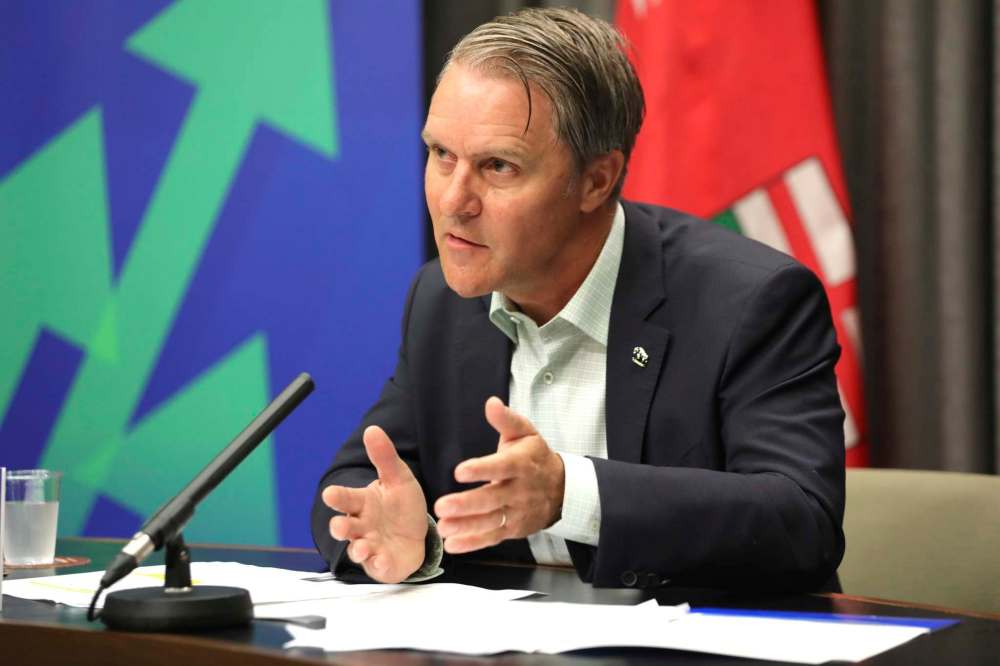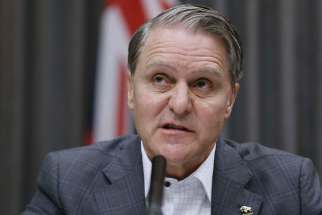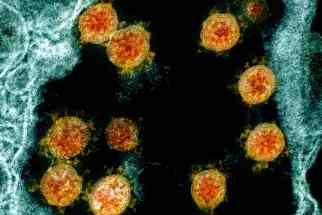Friesen ignored MDs’ alarms Health minister, senior officials failed to reply to multiple urgent warnings of oncoming critical-care calamity, letters reveal
Read this article for free:
or
Already have an account? Log in here »
To continue reading, please subscribe:
Monthly Digital Subscription
$0 for the first 4 weeks*
- Enjoy unlimited reading on winnipegfreepress.com
- Read the E-Edition, our digital replica newspaper
- Access News Break, our award-winning app
- Play interactive puzzles
*No charge for 4 weeks then price increases to the regular rate of $19.00 plus GST every four weeks. Offer available to new and qualified returning subscribers only. Cancel any time.
Monthly Digital Subscription
$4.75/week*
- Enjoy unlimited reading on winnipegfreepress.com
- Read the E-Edition, our digital replica newspaper
- Access News Break, our award-winning app
- Play interactive puzzles
*Billed as $19 plus GST every four weeks. Cancel any time.
To continue reading, please subscribe:
Add Free Press access to your Brandon Sun subscription for only an additional
$1 for the first 4 weeks*
*Your next subscription payment will increase by $1.00 and you will be charged $16.99 plus GST for four weeks. After four weeks, your payment will increase to $23.99 plus GST every four weeks.
Read unlimited articles for free today:
or
Already have an account? Log in here »
Hey there, time traveller!
This article was published 04/11/2020 (1861 days ago), so information in it may no longer be current.
Nine months before the first Manitoban was infected with the novel coronavirus, top physicians sounded the alarm about a five-alarm fire raging inside the province’s hospitals.
Without decisive action, they warned, disastrous and deadly consequences were on the horizon.
The message was consistent and clear: people will die.
A series of Winnipeg Regional Health Authority and Shared Health documents obtained by the Free Press show doctors told health officials about a serious shortfall of critical-care resources in the province for at least the past 15 months.
“Inadequate bed resources will result in discharging patients out of the (intensive-care unit) before they are ready in order to make space for other acutely ill patients,” reads a July 2019 report from WRHA critical-care physicians.
“We anticipate that this will result in increased patient mortality and morbidity.”
The report states that part of the rationale for the Tory government’s consolidation of the health-care system — which included a reduction in the number of ICU beds — was based on the idea that patient flow out of the units could be streamlined without a drop-off in quality care.
But the doctors said consolidation had the opposite effect: patient flow out of the ICU had become bottlenecked, with increasing numbers of “transfer ready patients” remaining in the wards for prolonged periods of time.
They warned the health-care system lacked surge capacity and that staffing levels were unsustainable. Among multiple recommendations, the doctors said the number of ICU beds in Manitoba needed to be increased.

As previously reported by the Free Press, Dr. Daniel Roberts, a critical-care physician at Health Sciences Centre and a professor of medicine at the University of Manitoba, later sent the concerns directly to Health Minister Cameron Friesen.
On Oct. 23, 2019, Roberts wrote to Friesen saying the health-care system lacked critical-care resources. He said unless an “additional six to 10 beds of surge capacity” was created prior to the height of flu season, there would likely be “multiple deaths.”
On a recent shift at HSC, Roberts wrote, “two critically ill patients” had their admission to the ICU “delayed by many hours,” and two other patients were “prematurely discharged” to make room, but had to be “readmitted within 24 hours.”
“There were no available beds in the city and none of the ICU patients were ready to be transferred,” Roberts wrote.
“I strongly suspect that by January or February we will all profoundly regret not having dealt with this problem.”
– Dr. Daniel Roberts, a critical-care physician at Health Sciences Centre in a letter to to Health Minister Cameron Friesen
He claimed the provincial government’s rationale for reducing ICU beds — that patient flow could be improved and efficiencies found — had proven false.
“I strongly suspect that by January or February we will all profoundly regret not having dealt with this problem,” Roberts wrote.
“Inquests often have that effect.”
Friesen did not respond to Roberts’ letter.
Twelve days later, on Nov. 4, 35 top-ranking doctors signed a letter sent to Dr. Brock Wright, CEO of Shared Health, and Real Cloutier, then-CEO of the WRHA. The letter was also sent to the department heads at Winnipeg hospitals.
The letter highlighted a “severe shortage of qualified ICU nurses,” which resulted in hospitals unable to properly “staff even the proposed, shrunken ICU bed base.”
“Nursing shortages are not easy to solve. It is imperative, however, that this… be addressed prior to February 2020,” the letter reads.
The doctors said that during the fall, which had seen normal levels of critically ill patients needing care, there was still “frequently insufficient ICU capacity.”
“With inadequate ICU beds, a severe flu season will be catastrophic with no ability to deal with surge demands for critically ill patients.”
– Letter to Dr. Brock Wright and Real Cloutier signed by 35 top-ranking doctors
“As intensive care physicians, we are gravely concerned that current ICU bed and nursing crises will contribute to significant and avoidable patient morbidity and mortality,” the doctors wrote.
“With inadequate ICU beds, a severe flu season will be catastrophic with no ability to deal with surge demands for critically ill patients.”
Two months later, on Jan. 8, Theresa Oswald, CEO of Doctors Manitoba, wrote to Vickie Kaminski, president and CEO of the WRHA, and Wright to point out the province had done nothing to address the issues raised by critical-care physicians in the preceding six months.
“This situation is now extremely concerning. Critical care specialists are describing this situation to us as a ‘crisis’ and ‘unprecedented.’ Therefore, we request an immediate action plan to open up additional capacity,” Oswald wrote.
On Wednesday, the Free Press requested comment from the province on what, if any, additional critical-care resources were funded in response to the repeated concerns raised by the doctors. In response, a provincial spokeswoman asked the Free Press to supply copies of the documents in order to better be able to provide comment by deadline.
The Free Press provided copies. The province did not respond by deadline.
Two weeks ago, on Oct. 21 — as Manitoba was inching closer to the dubious distinction of having the highest infection rate in the country — Roberts again wrote Friesen to warn the health-care system was on the brink of being overwhelmed. Roberts, alongside Drs. Pamela Orr and Philip St. John, both professors of medicine at U of M, said they were willing and eager to help the province “avert disaster.”
“This situation is now extremely concerning. Critical care specialists are describing this situation to us as a ‘crisis’ and ‘unprecedented.’ Therefore, we request an immediate action plan to open up additional capacity.”
– Theresa Oswald, CEO of Doctors Manitoba, in a letter to Vickie Kaminski, president and CEO of the WRHA
Again, Friesen did not respond.
That letter would not be the last time Friesen heard such concerns.
On Monday, 200 Manitoba doctors and scientists wrote an open letter to Premier Brian Pallister that said the health system needed emergency funding to deal with the ongoing spike in COVID-19 cases.
Unlike the letters from Roberts, this time Friesen did respond.
“I have to wonder at the motivation to produce that letter, to generate it at a time when they knew it would have maximum effect in causing chaos in the system,” Friesen said Tuesday during a legislative committee meeting.
“Manitobans need most to understand that the people in charge have got this.”
ryan.thorpe@freepress.mb.ca
Twitter: @rk_thorpe

Ryan Thorpe likes the pace of daily news, the feeling of a broadsheet in his hands and the stress of never-ending deadlines hanging over his head.
Our newsroom depends on a growing audience of readers to power our journalism. If you are not a paid reader, please consider becoming a subscriber.
Our newsroom depends on its audience of readers to power our journalism. Thank you for your support.
History
Updated on Wednesday, November 4, 2020 8:13 PM CST: updates pullquote attribution
Updated on Wednesday, November 4, 2020 11:00 PM CST: Adds letter












